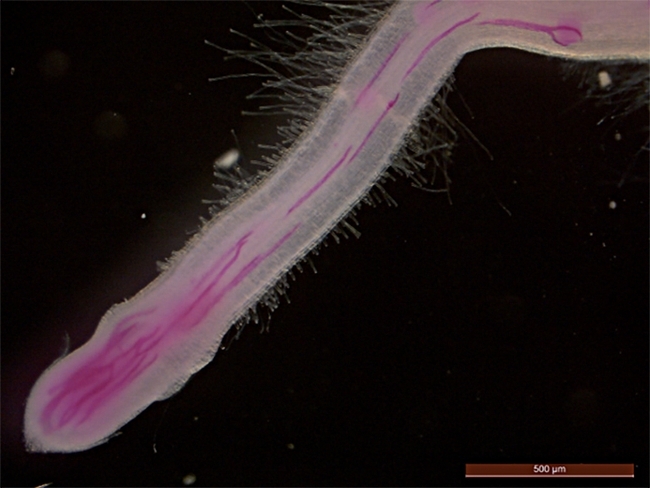
Today, during the 62nd annual international conference of the Society of Nematologists, being held July 9-14 in Columbus, Ohio, The Proceedings of the National Academy of Sciences (PNAS) published a UC Davis research team's important--and exciting--research paper on root-knot nematodes.
It's online at “Root-Knot Nematodes Produce Functional Mimics of Tyrosine-Sulfated Plant Peptides."
Basically, the researchers discovered that “both a harmful plant bacterium and a parasitic worm can mimic a plant peptide hormone to enhance their ability to infect plants.”
It's a joint project of nematologist Shahid Siddique, an associate professor in the Davis Department of Entomology and Nematology, and Siddique and UC Davis distinguished professor Pamela Ronald, a plant pathologist and geneticist in the Department of Plant Pathology and the Genome Center. They are the corresponding authors. Joint first-authors are Henok Zemene Yemer, formerly of the Siddique lab and now with Gingko Bioworks, Emeryville, and Dee Dee Lu of the Ronald lab.
It's like hijacking plant development to facilitate parasitism, according to Siddique. “This finding showcases an amazing case of convergent evolution across three different types of organisms, revealing how diverse life forms can develop similar strategies for survival.”

“Root-knot nematodes are a major threat to various crops, including fruit trees and vegetables,” Siddique said. “In California, tomatoes, almonds, and walnuts are among the major hosts susceptible to root-knot nematode infection.”
Siddique and UC Davis distinguished professor Pamela Ronald, a plant pathologist and geneticist in the Department of Plant Pathology and the Genome Center, are the joint corresponding authors. Joint first-authors are Henok Zemene Yemer, formerly of the Siddique lab and now with Gingko Bioworks, Emeryville, and Dee Dee Lu of the Ronald lab.
Plant-parasitic nematodes (PPNs) are among the most destructive plant pathogens, causing an annual economic loss of $8 billion to U.S. growers and more than $100 billion worldwide, the authors said.
The team also included emerita professor Valerie Williamson of the former Department of Nematology; Maria Florencia Ercoli, postdoctoral fellow in the Ronald lab; Alison Coomer Blundell, a doctoral candidate in the Siddique lab; and Paulo Vieira of the USDA's Mycology and Nematology Genetic Diversity and Biology Laboratory, Beltsville, Md.
“Plant peptides containing sulfated tyrosine (PSY)-family peptides are peptide hormones that promote root growth via cell expansion and proliferation,” the authors explained. “A PSY-like peptide produced by a bacterial pathogen has been shown to contribute to bacterial virulence. Here, we discovered that PSY-like peptides are encoded by a group of plant-parasitic nematodes known as root-knot nematodes. These nematode-encoded PSY mimics facilitate the establishment of parasitism in the host plant. Our findings are an example of a functional plant peptide mimic encoded by a phytopathogenic bacterium (prokaryote) and a plant-parasitic nematode (an animal).”

The project drew financial support from a collaborative grant awarded to Siddique and Ronald from the National Science Foundation's Division of Integrative Organismal Systems.
Siddique, a member of the UC Davis faculty since 2019, focuses his research on basic as well as applied aspects of interaction between parasitic nematodes and their host plants. “The long-term object of our research is not only to enhance our understanding of molecular aspects of plant–nematode interaction but also to use this knowledge to provide new resources for reducing the impact of nematodes on crop plants in California.”
Ronald, noted for her innovative work in crop genetics, especially rice, is recognized for her research in infectious disease biology and environmental stress tolerance. Thomson Reuters named her one of the world's most influential scientific minds and Scientfic American recognized her as among the world's 100 most influential people in biotechnology. In 2022 Ronald received the Wolf Prize in Agriculture.
The next steps? “Currently, we are working to understand the mechanism by which these peptides contribute to the nematode infection,” Siddique said. “This entails the characterization of receptors involved and gaining insights into transcriptional changes.”
Attached Images:
